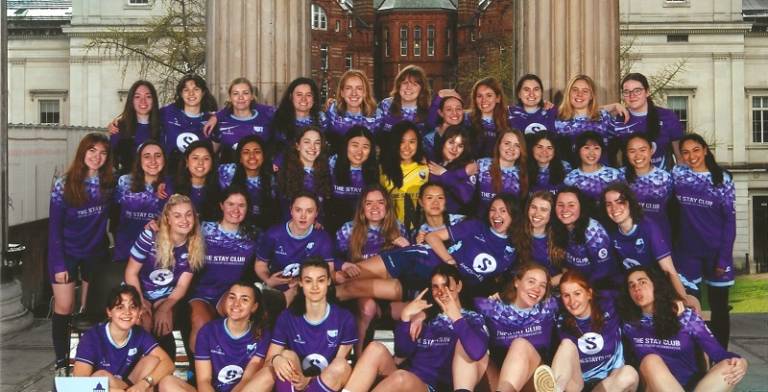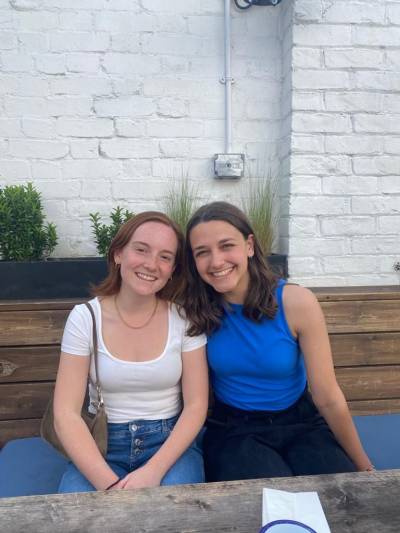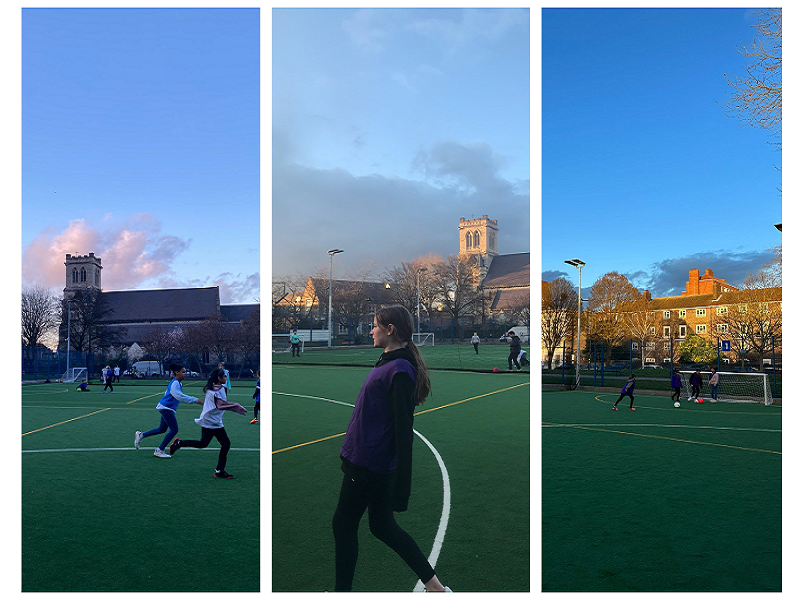“Girls Can Kick” – UCL Women FC’s new volunteer project encourages young girls to take up football
7 June 2023
UCLWFC has taken a step in empowering girls to play football with their new, award-winning volunteer project, “Girls Can Kick”, in collaboration with local football clubs. Student Journalist Annika Schwarze introduces the project that supports women in sport from an early age.

According to a study conducted by the charity Women In Sport in 2022, there is a concerning trend among girls disengaging from sports after primary school. The study revealed that a staggering 43% of girls who were once active participants and enjoyed sports eventually drop out. Addressing this issue, UCL’s Women's Football Club (UCLWFC), the largest university women’s football club in the UK, has taken a proactive approach by launching a volunteer project aimed at encouraging young girls to play football. Running football training sessions in cooperation with local football clubs, the volunteers take on a crucial role as role models by showcasing impressive skills, providing inspiration, and challenging preconceived notions. By breaking down stereotypes and proving that athleticism and femininity are not mutually exclusive, UCLWFC’s volunteers send a powerful message to the girls: that they too can excel in the sport and embrace their passion without limitations. Their presence serves as a living testament, instilling confidence and promoting a positive environment where girls can thrive both on and off the pitch.

Lily and Emilia, Project Leaders from Girls Can Kick
“We wanted to become role models ourselves”
Lily, a driven third year UCL student and one of the initiators of the project, articulated the primary objective with conviction: “Our main goal is to work with young girls and make football a fun sport, while also encouraging them to keep playing.” Her formative years spent playing football in the US served as a wellspring of inspiration. “In the US, there are many role models and other teams that I looked up to. I used to go and watch games frequently, and I noticed how important those experiences were for me in terms of staying motivated,” she shared. In England, on the other hand, the portrayal of girls’ sports substantially lacks support and falls short in garnering social respect and encouragement, according to Lily. “I think it’s really important that girls come to see that sports can be a part of their life and that being athletic and playing sports is something that can be just as rewarding and valuable for women as it is for men.”
Drawing from their own personal journeys, the project coordinators discovered mutual challenges on embodying their femininity and continuing playing football as they grew up and entered puberty. “There can be conflicting ideas about what it means to be a woman and how playing sports fits into that,” Lily says. According to the study by Women In Sport a fear of being judged and a lack of confidence were the main reasons cited for a waning interest in sport among teenage girls. Stephanie Hilborne, Women In Sport CEO said, “Teenage girls are not voluntarily leaving sport, they are being pushed out as a consequence of deep-rooted gender stereotypes and this presents a significant psychological barrier throughout life.” With this in mind, “Girls Can Kick” was crafted to provide support and cultivate a positive environment where the girls can freely engage in the sport. “We wanted to become role models ourselves,” emphasises Lily. Their project claims to be a space where aspirations for national team representation take a backseat to the fundamental enjoyment of playing and having fun. The ultimate aim is to foster a love for the sport and empower girls to persist despite societal pressures.

Evening training at UCL Women's FC
UCLWFC teams up with Camden & Islington United
“Girls Can Kick” is part of a larger programme established by the English Football Association that offers free football training sessions for girls aged 5–11 in cooperation with local football clubs. The FA has been working for years to promote female footballers. Indeed, football is now officially the biggest female team sport in England. Last season over female 147,000 players competed in affiliated league and cup competitions – a figure which has risen from just 10,400 in 1993, when records started. In 2020, the FA published their strategy to create a sustainable future for women’s and girls’ football in England. “[A big goal is] our pledge to transform the game at the grassroots level by ensuring that girls have equal access to football in schools and clubs,” says Baroness Sue Campbell, FA Director of Women’s Football. Since the 2022 UEFA European Women's Football Championship in England, there has also been a 196% increase in women’s and girls’ football session bookings, according to the FA.
UCLWFC works in partnership with Camden & Islington United (CANDI), a community-owned football club based in North London. Together, they provide complimentary football training sessions for girls in a relaxed and supportive environment. CANDI supplies qualified coaches who organise and oversee the sessions, carefully planning the drills and activities. As a volunteer, Lily’s responsibility is to actively engage with the girls. “We play alongside them, partner with them, provide them with different techniques, offer tips, showcase cool tricks and create a positive atmosphere filled with supportive talk and feedback,” explains Lily. The focus remains on creating a positive and enjoyable experience for the participants, with constant encouragement and constructive feedback.
During the sessions, Lily often finds herself reminiscing about the early days when she first started playing football, “It brings back a lot of memories and reminds us to think about the basics, how we learned our skills,” she shares. “It’s great to have an opportunity to serve as a mentor for young girls. Football has been such a big thing in our own lives and so it’s really rewarding to be able to pass some of that love down towards them.” When the girls encounter challenges, Lily and her fellow volunteers draw from their own experiences to guide and motivate them. Whether it’s suggesting different approaches or simply offer encouraging words like, ‘Hey, you’re doing great!’. Their strategy during the drills revolves around fostering an environment of support and empowerment.
“I wish we could bottle up and sell the energy created by UCLWFC’s volunteers”
Their strategic approach is yielding remarkable results, reports Lily. The volunteers involved in the “Girls Can Kick” programme have been receiving consistent positive feedback from both the girls and the coaches. After the inaugural session, Lily recalls an email sent by one of the coaches, describing the energy that the volunteers created in the girls as something very special that he would love to ‘bottle up and sell,’ Lily emphasises. “I think that sums up very well our role of bringing very positive energy just being there as female role models and just playing with the girls.”
With every session, the connection between the girls and the volunteers deepens, forging a stronger bond. “The girls are always excited to see us,” replies Lily. In fact, when a volunteer is missing a session, their absence is keenly felt by the girls. Lily finds herself hearing questions such as ‘Where are they?’ and ‘When are they coming back’. She states, “This very informal form of feedback lets us know that our impact is appreciated there and that the girls like it when we are there.”
In recognition of their commitment, the project has recently been honoured with the prestigious award for the best new student-led project of the year at UCL's annual Volunteering Awards.
“We hope to expand the project next year”
UCLWFC, driven by their vision for a sustainable and impactful volunteer project that leaves a lasting impact on the local community, have encountered various challenges along the way. Lily acknowledges the abundance of volunteers but the limited opportunities available, which presents a hurdle in setting up the programme effectively. “We have more volunteers than opportunities for them to volunteer, as it is quite difficult to set up.” Safety procedures for young children require another layer of complexity, as diverse safeguarding rules differ across clubs, and it is necessary for all volunteers to complete DBS checks, which has proved time-consuming.
To ensure the project's success, careful consideration has been given to avoid overwhelming volunteers, taking into account factors like upcoming exams. “We have done this partnership with CANDI as a trial run and hope to expand it next year,” announces Lily. In addition to this collaboration, other local clubs are also seeking volunteers and coaches, signalling the potential for further partnerships on the horizon. “We hope to have more partnerships in the future,” explains Lily, “and hopefully, we’ll be able to get some coaching qualifications to hopefully form a more equal footing partnership in terms of coaching.” As UCLWFC strives to overcome challenges and broaden their impact, their dedication to expanding volunteer opportunities and forming valuable alliances remains unwavering.

About the author:
Annika Schwarze is a second-year Affiliate student in the European and International Social and Political Studies (EISPS) department, on her year abroad from the Free University of Berlin. A huge music enthusiast, she started a music blog in Germany as a way to break into music journalism, and has since worked in the radio and social media industries. She hopes to use her experience as a VPEE student journalist to gain experience writing in English about the issues that interest her.
Image attribution (when not belonging to UCL): Kindly provided by Girls Can Kick/UCLWFC.
 Close
Close

